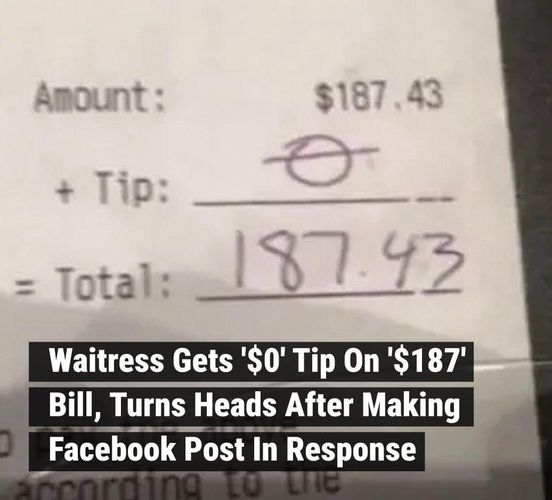Taylar Cordova, a waitress from Colorado, received a $0 tip on a $187.43 bill. Outraged, she took to Facebook, posting a photo of the receipt along with a passionate message. Cordova highlighted the reality of working as a server, where tips are essential since the base pay is just $2.13 an hour. Her post struck a chord, emphasizing the unfair treatment servers face when customers don’t tip. Her closing advice? “Don’t walk into a restaurant if you can’t afford to tip.”
Servers and the Tip Struggle
Cordova’s post not only detailed her own frustration but shed light on a broader issue that many servers in the United States experience. The U.S. Department of Labor allows employers to pay tipped workers as little as $2.13 per hour, relying on tips to make up the difference to reach the minimum wage. This reality means that servers depend heavily on tips to make a livable income. When customers fail to tip, it’s more than just a slight inconvenience; it’s a direct hit to their financial stability.
Many people are unaware of the fact that in the U.S., tipping is not just a bonus; it’s a significant portion of the server’s income. Cordova’s post served as a public reminder of this fact, raising awareness of the struggles of those who work in the service industry. Her post read: “You are the lowest of the low,” directly addressing the customer who left no tip. However, the statement wasn’t just aimed at one person; it was a call to all diners to reconsider their responsibility when it comes to tipping.
The Impact of Cordova’s Post
The boldness of Cordova’s post resonated deeply with the public. Her post was shared more than 15,000 times on social media, with many servers and customers alike chiming in on the conversation. While some defended the idea that tipping should be based on service quality, many were quick to point out that in America’s tipping culture, a zero-dollar tip is not just an evaluation of service but a damaging blow to the server’s livelihood.
Cordova also touched on the ethics of tipping, writing, “There’s a McDonald’s down the street if you’re that cheap.” This stark statement further fueled the discussion on the importance of tipping etiquette and whether certain customers should dine in sit-down restaurants if they do not intend to tip.

Debate Over Tipping Culture
Cordova’s experience sparked a wider debate on tipping culture in the U.S. Some argued that restaurants should pay servers higher wages to avoid the reliance on tips altogether. They point to countries like Australia and parts of Europe, where tipping is rare, and servers are paid a standard wage that doesn’t require them to rely on customer generosity. In contrast, others defended the current system, saying that tips are a reflection of service and should not be automatic.
While Cordova’s post might have initially been a personal venting session, it turned into something larger. The thousands of shares and comments reflect a society grappling with how tipping should function in the modern dining experience. Should tipping be mandatory, or should restaurants take the burden of paying their employees a fair wage without relying on customers?
The Emotional Toll on Servers
Beyond the financial hit, servers like Cordova often face an emotional toll from receiving low or no tips. The service industry is fast-paced and demanding, with servers often juggling multiple tables, remembering orders, and ensuring diners have a pleasant experience. When they receive no compensation for their hard work, it can feel like their efforts were unappreciated, leading to burnout and frustration.
Cordova’s decision to publicly air her frustration wasn’t just about the money. It was also a way to call attention to the respect servers deserve for their hard work. Her story highlighted how tipping culture places servers in a precarious position, depending on the generosity of strangers for their livelihood.
Changing the Culture
In response to Cordova’s viral post, there have been renewed calls for restaurants to rethink their compensation models. Some businesses have already started experimenting with eliminating tipping altogether, opting instead to pay servers a higher hourly wage and include service fees in the bill. This model ensures that servers are fairly compensated regardless of the tipping habits of customers.
However, this change has been slow to catch on, and many in the industry are resistant to altering the status quo. Some argue that tipping incentivizes better service, while others believe that it places too much power in the hands of the customer. As Cordova’s story continues to circulate, it serves as a reminder that while tipping may be a tradition in the U.S., it’s also a deeply flawed system that leaves many servers vulnerable.
Conclusion
Taylar Cordova’s story of receiving a $0 tip on a large bill is more than just a tale of one customer’s poor tipping habits. It shines a light on the struggles that many servers face, working long hours for minimal pay while relying on tips to make ends meet. Her viral Facebook post not only struck a nerve with the public but also sparked a broader conversation about tipping culture in America. Whether or not the system changes, Cordova’s bold response serves as a powerful reminder of the respect and fairness that all workers deserve.

